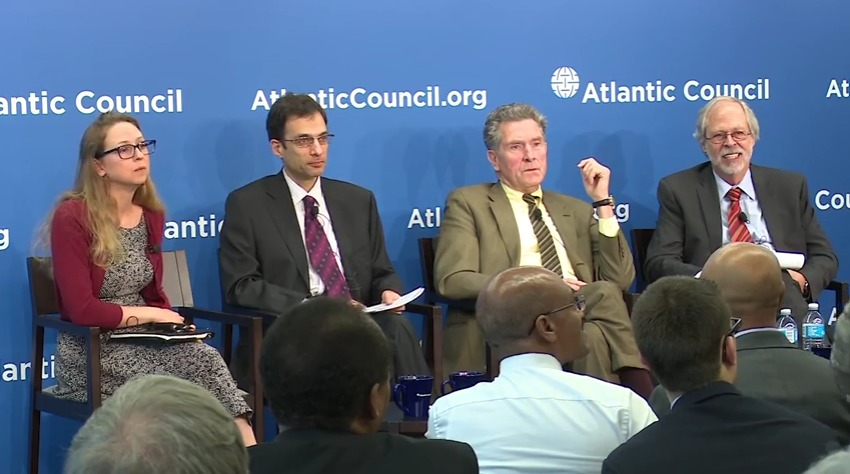[Video] Atlantic Council Panel Discusses Eritrea
Eritrea: Coming In from the Cold
By Bronwyn Bruton
ISSUE BRIEF
The Horn of Africa, long recognized as one of the world’s most unstable regions, is undergoing a round of seismic shifts. Massive and sustained anti-government demonstrations in Ethiopia have laid bare the fundamental brutality and instability of the ruling Ethiopian People’s Revolutionary Democratic Front, which is Washington’s major security partner in the region. Tiny Somaliland and Djibouti are on high alert, bracing for a tide of Ethiopian refugees that—particularly in the midst of drought—could easily overwhelm those territories. South Sudan, the youngest nation on earth, has become a killing field. And the Westernfunded peacekeeping coalition in Somalia, which has been fighting the al-Qaeda linked terror group al-Shabaab since 2007, is critically fatigued and losing ground. These multiple nodes of instability pose a significant and immediate threat to US interests in the region.
Eritrea has long been stigmatized as a “spoiler” by Washington and stands accused of supporting terrorism. In 2009, at Washington’s urging, Eritrea was sanctioned by the United Nations for supporting al-Shabaab and for refusing to settle a border dispute with Djibouti. However, years of scrutiny by the United Nations Somalia and Eritrea Monitoring Group (UNSEMG) have yielded no evidence that Eritrea continues to be involved in Somalia, and the Djibouti conflict is mediated by Qatar.2
A number of surprising developments have recently occurred in Eritrea, suggesting that the country is determined to throw off isolation for positive engagement in its foreign policy since the sanctions were applied. An engaged Eritrea would be very good news for the region at a time when Washington’s status quo approaches to Ethiopia, Somalia, and South Sudan are visibly failing.
If the United States can encourage Eritrea on a trajectory of re-engagement, it should. But to do that, Washington must drop outdated notions about the threat that Eritrea poses. At a time when the Kenyan army has annexed parts of southern Somalia and is trafficking with al-Shabaab,3 when the Ugandan army is taking sides in South Sudan,4 and Ethiopian forces have killed hundreds and detained tens of thousands of protestors calling for government reform,5 Eritrea truly ranks among the least of the United States’ security concerns.
A disordered Ethiopia will make Eritrea more important to US security interests. By virtue of its geographic position between Ethiopia and Yemen, Eritrea is bound to serve either as a bridge or a barrier to the passage of terrorists between the Persian Gulf and the Horn of Africa. Thus far, Eritrea has repelled jihadists and proven immune to radical ideologies. This is a role for which it has received little credit. But Washington cannot afford to take Eritrea’s implicit cooperation in its counterterror efforts for granted.
If Eritrea is overwhelmed with refugees, or otherwise sucked into the Red Sea region’s growing unrest, the United States could find itself facing instability and perhaps a terror threat on both sides of the Mandeb Strait, which is a critical chokepoint for the $700 billion dollars of trade passing annually between the European Union (EU) and Asia. Threats to this trade route have in recent years led the United States to pour millions of dollars into combating Somali piracy—an indication of the Strait’s importance to US interests.6
For these reasons, the United States ought to be concerned about its inability to project influence in Eritrea. This paper aims to assist the incoming US administration in securing US interests by offering a blueprint for improving relations with Asmara.
Continue reading below:
Eritrea Coming in From the Cold Web 1207 by Anonymous XG5TrO on Scribd
[Video] Atlantic Council Panel Discusses Eritrea
 Reviewed by Admin
on
12:45 AM
Rating:
Reviewed by Admin
on
12:45 AM
Rating:
 Reviewed by Admin
on
12:45 AM
Rating:
Reviewed by Admin
on
12:45 AM
Rating:


No comments: